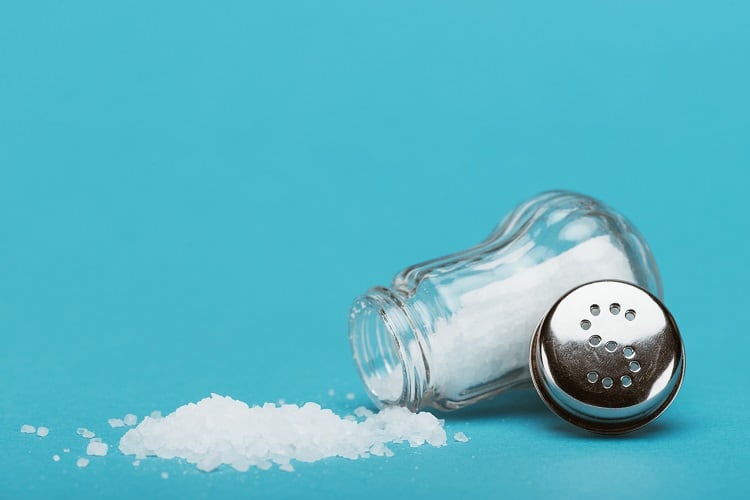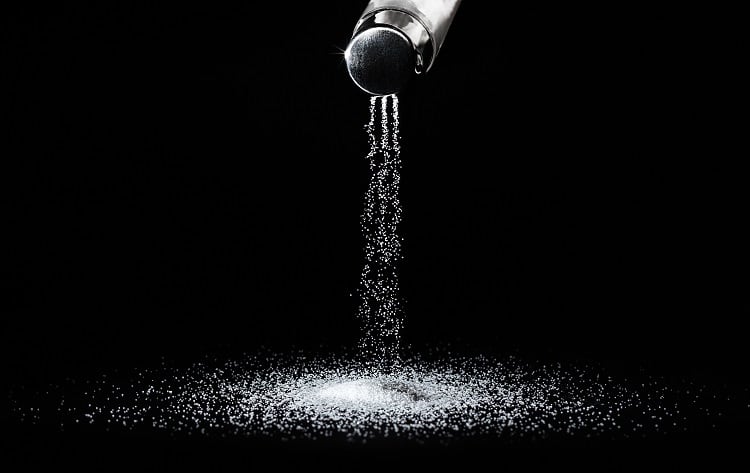Excessive salt consumption is a global concern. In the UK, for example, where it is recommended people consume no more than 6g – equating to roughly one level teaspoon – of salt per day, average salt intake actually sits closer to 8.1g per day.
A diet too high in salt raises blood pressure and increases health risks. Salt reduction, therefore, offers an important opportunity to improve population health.
Indeed, it has been estimated that if the UK population were to cut its daily intake from 8.1g to the recommended 6g per day, it would reduce the number of strokes by 22% and heart attacks by 16%.
Salt substitutes are one way consumers, and food manufacturers, can reduce salt intake. Potassium-based sodium replacers, in particular, have been shown to lower blood pressure. However, to date, their effects on cardiovascular and safety outcomes have been uncertain.
Now, a new study – considered one of the largest dietary intervention studies ever conducted – has examined the effects of swapping out table salt for a reduced sodium, added potassium substitute on population health.
‘Making the swap would save lives’
The study, published in the New England Journal of Medicine, analysed data from an open-label, cluster-randomised trial involving 20,995 people from 600 villages in rural China. The participants had a history of stroke or were 60 years of age or older and had high blood pressure.
The villages were then assigned, at random, in a 1:1 ratio to the invention group, in which the participants used a salt substitute made up of 75% sodium chloride and 25% potassium. In the control group, participants continued to use regular table salt, made up of 100% sodium chloride.
Follow-up analyses were conducted on the same participants between on average 4.5 and 5 years.
Findings revealed that compared to the control group, the rates of stroke, major cardiovascular events, and death were lower in participants that consumed the sodium chloride and potassium salt substitute.
Researchers also tested for high potassium (clinical hyperkalemia), which was not found to be significantly higher with the salt substitute than with regular salt.
A ‘low cost’ solution
According to lead investigator Professor Bruce Neal of The George Institute for Global Health, the proposition is relatively cheap. “…While salt substitute are a bit more expensive than regular salt, they’re still very low cost – just a few dollars a year to make the switch.”
In China, regular salt is priced at around US$1.08 per kilo, whereas the salt substitutes carry a price tag of around US$1.62 per kilo. Because the substitutes are ‘relatively cheap’, Professor Neal said they are likely to be ‘very cost effective too’.
“This is quite simply the single most worthwhile piece of research I’ve ever been involved with. Switching to table salt to salt substitute is a highly feasible and low-cost opportunity to have a massive global health benefit.”

For study co-author Feng He, Professor of Global Health Research at the Wolfson Institute of Population Health, Queen Mary University of London, the study provides the evidence that using a salt which contains less sodium and more potassium will effectively reduce salt intake and increase potassium, thereby reducing the risk of people suffering from strokes and death from any cause.
“Globally, millions of lives would be saved by this simple approach,” he noted.
“Salt consumption in China is amongst the highest in the world, with average salt intakes (10-12g/day) more than double the WHO recommended limit (less than 5g/day),” Professor He continued. “In China and most developing countries, the majority of salt in the diet is added by the consumer, therefore encouraging people to use less during cooking is the best strategy to improve public health.”
Spotlight on UK: Gov’t needs to ‘urgently act’
Considering the study results in a UK context, Professor Graham MacGregor, who is both Chairman of World Action on Salt and Health and Professor of Cardiovascular Medicine at Barts and the London School of Medicine, said it is ‘very important’ the study demonstrates that consumers should be encouraged not to add salt to food, but if they have it, “it’s vital that they use a reduced sodium with added potassium salt”.
Professor MacGregor also believes the food industry can reduce the ‘huge amounts’ of salt they add to food, and safely replace it where necessary with potassium salt.

As it stands, the UK Government sets voluntary salt reduction targets for industry – with different various iterations published since 2006. The most recent set of guidelines challenge manufacturers and retailers, as well as out of home, takeaway, and delivery players, to meet new salt reduction goals by 2024.
The World Action on Salt and Health Chairman believes this salt reduction programme has been previously ‘very successful’ in encouraging industry to reduce the amount of salt they add to food. However, this policy has been ‘stalled’ by ‘lack of government action’ in forcing the industry to reduce salt further, he noted.
“The Department of Health and Social Care, which has taken over Public Health England’s responsibility in this area, needs to urgently act to get the food industry to reduce the amount of salt they add to food and save the maximum number of people dying unnecessarily from stroke.”
While mandatory measures are not yet in place, a recently published independent review led by businessman Henry Dimbleby, recommends the UK adopt such an approach. Dimbleby’s National Food Strategy paper proposes the UK introduce a £6/kg tax on salt sold for use in processed foods or in restaurants in catering businesses.
According to the document, this tax would lower the average salt intake by 0.2-0.6g per person per day.
Source: The New England Journal of Medicine
'Effect of Salt Substitution on Cardiovascular Events and Death'
Published 29 August 2021
DOI: 10.1056/NEJMoa2105675
Authors: Bruce Neal, Yangfeng Wu. Xiangxian Feng, Ruijuan Zhang, Yuhong Zhang, Jimgpu Shi, Jianxin Zhang, Maoyi Tian, Liping Huang, Zhifang Li, Yan Yu, Yi Zhao et al.



